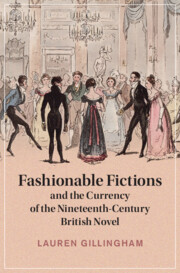Book contents
- Fashionable Fictions and the Currency of the Nineteenth-Century British Novel
- Cambridge Studies in Nineteenth-Century Literature and Culture
- Fashionable Fictions and the Currency of the Nineteenth-Century British Novel
- Copyright page
- Contents
- Figures
- Acknowledgements
- Introduction: Fashion and Its Vicissitudes
- Part I The Silver-Fork Novel and the Transient World
- Part II Demotic Celebrities
- Part III Hypercurrency and the Sensation Novel
- 5 Affective Distance and the Temporality of Sensation Fiction
- Coda
- Bibliography
- Index
- Cambridge Studies in Nineteenth-Century Literature and Culture
5 - Affective Distance and the Temporality of Sensation Fiction
from Part III - Hypercurrency and the Sensation Novel
Published online by Cambridge University Press: 11 May 2023
- Fashionable Fictions and the Currency of the Nineteenth-Century British Novel
- Cambridge Studies in Nineteenth-Century Literature and Culture
- Fashionable Fictions and the Currency of the Nineteenth-Century British Novel
- Copyright page
- Contents
- Figures
- Acknowledgements
- Introduction: Fashion and Its Vicissitudes
- Part I The Silver-Fork Novel and the Transient World
- Part II Demotic Celebrities
- Part III Hypercurrency and the Sensation Novel
- 5 Affective Distance and the Temporality of Sensation Fiction
- Coda
- Bibliography
- Index
- Cambridge Studies in Nineteenth-Century Literature and Culture
Summary
Using Mark Salber Phillips’s concept of historical distance to defamiliarize our ideas about proximity in historical representation, Chapter 5 examines the sensation novel’s innovations with temporal and spatial immediacy to illuminate its rendering of modernity as rife with incongruous affects. Reading Mary Elizabeth Braddon’s Lady Audley’s Secret (1862) and Aurora Floyd (1863), this chapter shows that the sensation novel characterizes the present in terms of affective excess, drawing into focus a perpetual tension between forces of attraction and repellence, captivation and alienation in contemporary life. Moving beyond critical readings that try to decide the question of Braddon’s subversion or reinforcement of social norms, I contend that her fiction keeps the affective incongruities of the heroines case in play in order to articulate the extreme contradictions that characterize the forms of belonging governing contemporary experience.
Keywords
- Type
- Chapter
- Information
- Publisher: Cambridge University PressPrint publication year: 2023

